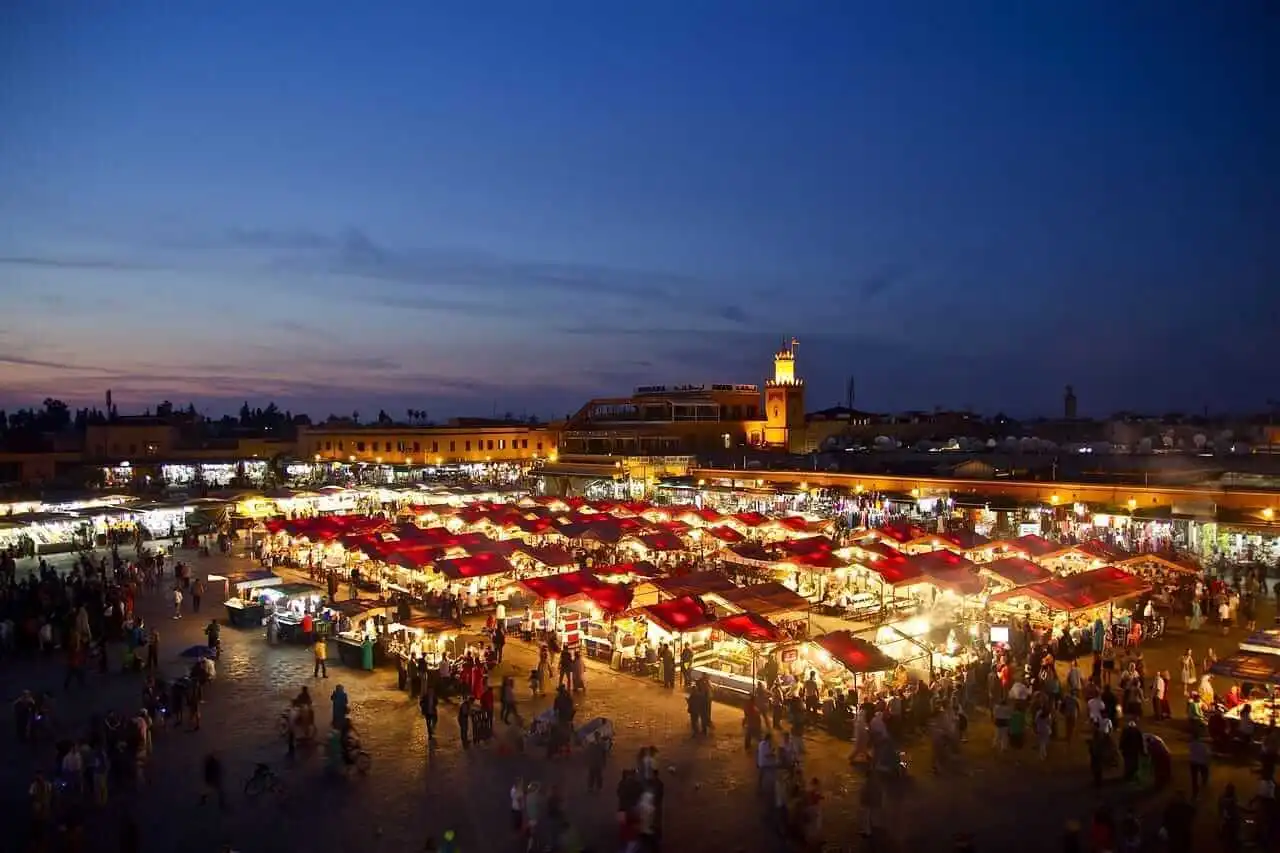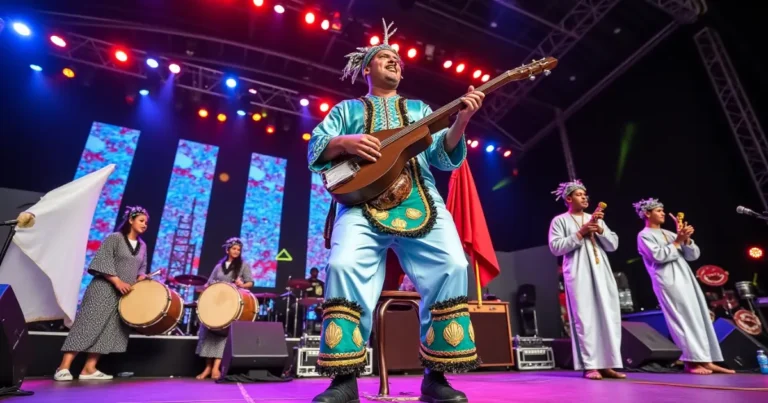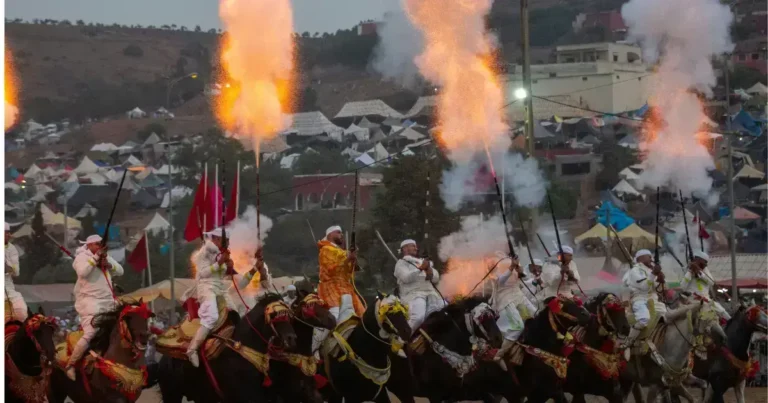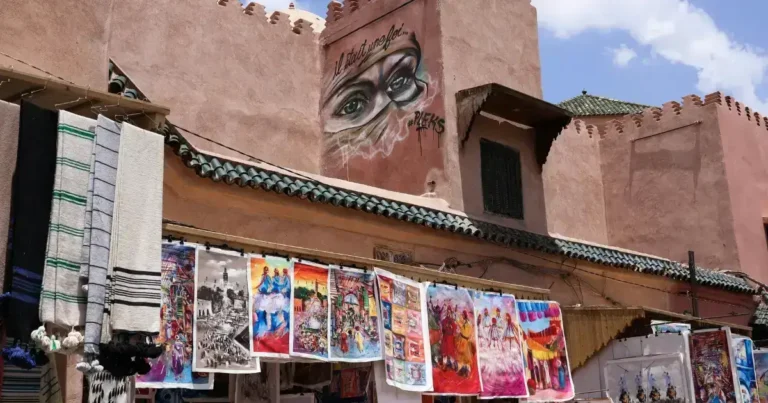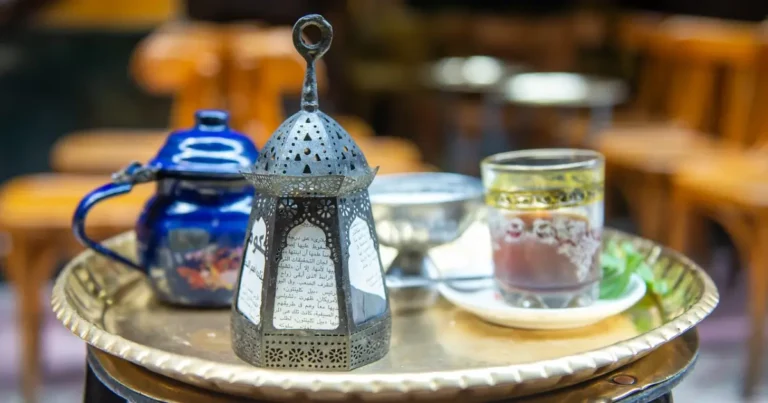Why Do People Travel to Morocco? Discover the Top Attractions
Why Do People Travel to Morocco? Discover the Top Attractions
Table of Contents
Morocco is a place of exotic landscapes, vibrant culture, and unforgettable experiences.It’s a prime destination for adventure seekers. Travelers can explore stunning environments and rich traditions here.
Your journey in Morocco starts with a mix of old and new. You’ll see the lively medinas of Marrakech and the calm Sahara Desert. Morocco offers a unique mix of experiences that excite and challenge.
Looking for culture, history, or natural beauty? Morocco has it all. It’s a place of excitement, wonder, and change.
Key Takeaways
- Diverse landscapes ranging from mountain ranges to desert environments
- Rich cultural heritage with centuries of historical significance
- Unique blend of African, Arab, and European influences
- Extraordinary culinary experiences and traditional cuisine
- Warm hospitality and welcoming local communities
- Affordable travel destination with exceptional value
The Enchanting Appeal of Morocco’s Rich Cultural Heritage
Morocco offers a journey into a world of vibrant traditions. You’ll find ancient customs, rhythmic music, and warm hospitality. This makes Morocco stand out from other places.
Travelers looking for real morocco tourism attractions will find a land full of life. Moroccan heritage makes every trip special and full of cultural experiences.
Traditional Moroccan Music and Dance
Moroccan music is a mix of Berber, Arab, and African styles. You’ll hear unique sounds that tell stories through rhythms and passion:
- Gnawa music with its spiritual trance-like beats
- Andalusian classical music reflecting historical sophistication
- Berber folk songs celebrating community and resilience
Ancient Customs and Festivals
Morocco’s culture is alive with festivals that show off old traditions. Events like the Imilchil Marriage Festival and Ramadan celebrations give deep insights into local life.
” In Morocco, each celebration is a vibrant display of cultural expression.” – Moroccan Cultural Historian
Local Lifestyle and Hospitality
Moroccan hospitality is key to the cultural experience. Locals greet visitors with mint tea, talks, and warmth. This makes tourists feel like honored guests.
- Tea ceremonies symbolizing friendship and respect
- Communal dining experiences
- Intricate social customs reflecting deep-rooted values
Why Do People Travel to Morocco: A Journey Through Time
Morocco’s history is a fascinating blend of cultural intersections. It draws travelers from around the world. Your journey through this fascinating country reveals a rich historical landscape.
Each civilization has left an indelible mark on Morocco’s architectural and cultural experiences.
The roots of Morocco’s historical significance stretch back thousands of years. Berber kingdoms, Roman settlements, Arab conquests, and European influences have woven a complex narrative. This makes Morocco’s history and architecture truly unique.
- Ancient Berber civilizations established early settlements
- The Arab Islamic conquest of the 7th century reshaped cultural dynamics.
- Phoenician and Roman traders left archaeological remnants
- Medieval Islamic dynasties developed sophisticated urban centers
Architectural marvels stand as silent witnesses to these historical transformations. From the intricate tilework of Fez’s medinas to the grand kasbahs of the Atlas Mountains, every structure tells a story.
“”Morocco is more than just a destination; it is a living museum of human civilization.” – Cultural Historian
Every region of Morocco provides a distinct glimpse into its rich history. Coastal cities reflect maritime trade histories. Inland regions showcase traditional Berber and Arab architectural styles that have survived centuries of change.
When you explore Morocco, you’re not just visiting a country. You’re experiencing a living, breathing chronicle of human interaction, cultural exchange, and architectural brilliance.
Exploring Morocco’s Imperial Cities and Historic Landmarks
Morocco’s imperial cities are stunning examples of the country’s history and architecture. They show centuries of culture that have made Morocco unique.
The architecture in Morocco tells stories of old civilizations and royal families. Each detail in the buildings reflects Morocco’s rich history.
Architectural Marvels of Fez and Marrakech
Fez and Marrakech are the focal points of Morocco’s history and architecture. These cities have buildings that mix Berber, Arab, and Andalusian styles:
- Intricate mosaic tile work
- Elaborate carved wooden doorways
- Stunning geometric patterns
- Ancient madrasas with complex architectural details
Royal Palaces and Ancient Medinas
The royal palaces and ancient medinas give a deep look into Morocco’s architecture. Visitors can see:
- Bahia Palace in Marrakech
- Dar al-Makhzen in Fez
- Detailed courtyards with marble fountains
- Ornate reception halls decorated with traditional craftsmanship
UNESCO World Heritage Sites
Morocco has many UNESCO World Heritage Sites. They show the country’s amazing architecture and culture:
| Site | Location | Significance |
| Medina of Fez | Fez | Oldest imperial city with preserved medieval urban landscape |
| Medina of Marrakech | Marrakech | Historic urban center with remarkable architectural ensemble |
| Ait Benhaddou | Ouarzazate Province | Outstanding example of southern Moroccan architecture |
“Each stone in Morocco’s imperial cities whispers stories of centuries past, inviting travelers to step back in time and experience living history.” – Moroccan Cultural Heritage Commission
These architectural wonders offer a unique look into Morocco’s culture. They are essential destinations for history and architecture enthusiasts.
Adventures in the Sahara Desert: From Dunes to Oases
Imagine stepping into a world of endless golden sands and breathtaking landscapes. Morocco desert tours offer an unparalleled adventure. They turn ordinary travel into an extraordinary experience. The Sahara Desert beckons adventurers with its mesmerizing terrain and unique cultural encounters.
Your morocco adventure travel begins with iconic experiences that will stay with you forever:
- Camel trekking across stunning sand dunes
- Overnight stays in traditional Berber camps
- Stargazing in the vast desert wilderness
- Exploring remote desert oases
The desert landscape provides more than just scenic views. Each journey tells a story of ancient traditions and untouched natural beauty. Travelers can immerse themselves in authentic experiences. They can learn traditional navigation techniques and understand the resilient desert ecosystem.
“The Sahara is not just a destination, it’s a transformation.” – Experienced Desert Guide
Morocco desert tours range from single-day excursions to multi-day expeditions. They cater to different adventure levels and interests. Professional guides ensure safe and meaningful interactions with this extraordinary environment.
Whether you’re an adventure seeker or a cultural enthusiast, the Sahara promises an unforgettable journey. It connects you with one of the world’s most remarkable landscapes.
Culinary Delights: A Taste of Authentic Moroccan Cuisine
Morocco’s food and cuisine take you on a journey through centuries of tradition. Exploring Morocco’s culture means diving into its rich and vibrant food world.
Moroccan cuisine is a mix of Berber, Arabic, and Mediterranean flavors. Each dish shares a story of cultural heritage and regional diversity. It invites you to taste flavors perfected over generations.
Traditional Tagine and Couscous Dishes
At the heart of Moroccan cooking are two iconic dishes:
- Slow-cooked tagine with tender meats and aromatic spices
- Fluffy couscous topped with stewed vegetables and succulent proteins
Spice Markets and Cooking Classes
Explore Morocco’s culinary world by visiting vibrant spice markets. These colorful bazaars offer an incredible array of spices like:
- Saffron
- Cumin
- Paprika
- Cinnamon
Many travelers take cooking classes to learn traditional recipes. They understand the intricate art of Moroccan cuisine.
Mint Tea Culture and Ceremonies
“Mint tea is more than a drink in Morocco—it’s a symbol of hospitality and friendship.”
The ritual of preparing and serving mint tea is key in Moroccan social interactions. This sweet, refreshing beverage is served with elaborate ceremonies. These ceremonies reflect deep cultural respect and warmth.
Shopping Paradise: From Souks to Artisan Workshops
Exploring Morocco’s shopping and souvenirs is like going on an adventure. You’ll find a world of cultural experiences that make shopping special. The souks, or traditional markets, take you deep into Morocco’s artisan heritage.
Every shopping trip reveals unique handicrafts from different areas. These markets share stories of skilled craftspeople keeping old traditions alive.
- Marrakech Souks: Leather goods and intricate metalwork
- Fez Markets: Handwoven carpets and ceramic pottery
- Essaouira: Argan oil products and wooden crafts
Artisan workshops in Morocco are where cultural experiences come alive. You can see master craftsmen at work. They make everything from beautiful tiles to traditional carpets.
| Craft Type | Region | Typical Price Range |
| Leather Goods | Marrakech | $20 – $200 |
| Ceramic Pottery | Fez | $15 – $150 |
| Berber Carpets | Atlas Mountains | $100 – $500 |
“In Moroccan markets, every purchase is a conversation, every souvenir a memory.” – Moroccan Artisan Proverb
Pro tip: Always negotiate prices with respect. Appreciate the skill in each item. Your shopping trip becomes a way to connect with the culture.
Natural Wonders: From Atlas Mountains to Coastal Escapes
Morocco’s diverse landscape offers breathtaking morocco adventure travel experiences. It captures the imagination of nature enthusiasts. From soaring mountain peaks to pristine Mediterranean coastlines, the country presents an incredible array of natural tourism attractions. These promise unforgettable journeys.
Mountain Trekking Adventures
The Atlas Mountains provide an extraordinary playground for hikers and adventure seekers. Stretching across Morocco, these majestic peaks offer challenging trails through stunning terrain. Your morocco tourism attractions experience can include:
- High-altitude trekking in the High Atlas range
- Exploring traditional Berber villages
- Scenic routes through dramatic mountain landscapes
- Opportunities for rock climbing and mountain biking
Coastal Cities and Mediterranean Beaches
Morocco’s coastal regions present a different kind of natural beauty. Cities like Essaouira and Agadir showcase stunning shorelines. They blend historical charm with spectacular ocean views. Travelers can enjoy:
- Surfing along Atlantic coastlines
- Relaxing Mediterranean beach experiences
- Waterfront dining with fresh seafood
- Water sports and marine activities
Natural Parks and Wildlife
Wildlife enthusiasts will discover remarkable ecosystems across Morocco’s protected regions. National parks offer unique opportunities to explore diverse habitats. They allow you to observe indigenous species.
| National Park | Key Wildlife | Unique Features |
| Toubkal National Park | Barbary Sheep | Highest mountain range in North Africa |
| Souss-Massa National Park | Endangered Bird Species | Critical habitat for migratory birds |
| Ifrane National Park | Barbary Macaques | Cedar forest ecosystem |
“Morocco’s natural landscapes are a testament to the country’s incredible geographical diversity.” – National Geographic Traveler
Each region offers a unique morocco adventure travel experience. It invites you to explore a world of natural wonders. These range from mountain peaks to coastal paradises.
Conclusion
Morocco’s tourism attractions take you on a journey through vibrant colors, ancient traditions, and stunning landscapes. From Marrakech’s bustling markets to the calm Sahara Desert, Morocco offers an unforgettable experience. It changes how you see travel.
Exploring Morocco’s culture shows a mix of history, hospitality, and beauty. The country’s blend of Berber, Arabic, and European cultures makes it unique. It’s perfect for those who want real and deep experiences.
Every part of Morocco has its own story. From the detailed tiles in old medinas to the friendly local artisans. Your trip will be full of sights and sounds: markets filled with spices, traditional music, amazing buildings, and beautiful landscapes.
Plan your Moroccan trip and get ready to be amazed. Morocco is a place where old meets new, where people are always welcoming, and every moment is special. Your dream of finding a place like this starts in Morocco.
What is the best time to visit Morocco?
The ideal times to visit Morocco are during spring (March to May) and autumn (September to November). These seasons have mild and comfortable temperatures. They are perfect for exploring cities, deserts, and mountains without extreme weather.
Is a visa required to travel to Morocco?
Many countries, including the US, Canada, and most of Europe, don’t need a visa for Morocco for up to 90 days. A valid passport with a minimum of six months’ validity is required. Always check the latest entry rules before you go.
Is Morocco safe for tourists?
Morocco is usually safe for tourists. But, it’s wise to be careful. Know your surroundings, keep your belongings safe, and avoid lonely places at night. Most visitors enjoy their time without encountering any problems.
What language is spoken in Morocco?
Arabic is the official language, with Berber also common. Many people in tourist spots speak French, and English is becoming more popular in big cities. Learning some Arabic or French can make your trip better.
What currency is used in Morocco?
The official currency of Morocco is the Moroccan Dirham (MAD).Although credit cards are widely accepted in large cities and tourist spots, it’s recommended to carry cash for minor purchases and in rural areas. Currency can be exchanged at banks, airports, and hotels.
What should I wear in Morocco?
As Morocco is predominantly a Muslim country, dressing modestly is essential. Women should cover their shoulders and knees. While casual attire is fine in cities, it’s best to dress more conservatively in rural areas. Given the warm climate, lightweight and breathable clothing is recommended.
How can I experience Moroccan cuisine?
Moroccan cuisine offers a variety of flavors, with dishes like tagine, couscous, and pastilla. Consider joining a cooking class in cities such as Marrakech or Fez to deepen your culinary experience. Visiting local markets to enjoy mint tea and sampling street food or dining at local restaurants will allow you to truly experience the country’s food culture.
What are the must-visit spots in Morocco?
Don’t miss the bustling medina of Marrakech, the historical charm of Fez, camel treks through the Sahara Desert, the scenic blue streets of Chefchaouen, and the stunning Atlas Mountains for outdoor adventures. These locations each offer a distinct view into Morocco’s culture and natural beauty.
What transportation options are available in Morocco?
Morocco offers a range of transport options, including trains, buses, grand taxis, and domestic flights for long journeys. Within cities, petit taxis are convenient for short trips. For more remote destinations, hiring a private driver or joining a guided tour is recommended.
What is the recommended budget for a trip to Morocco?
Your daily expenses in Morocco will vary based on your travel preferences. Budget travelers might spend $30-50 per day, while those seeking a mid-range experience may spend $100-200 daily. Luxury travelers can expect to spend $300 or more, depending on accommodations, meals, transportation, and activities.

